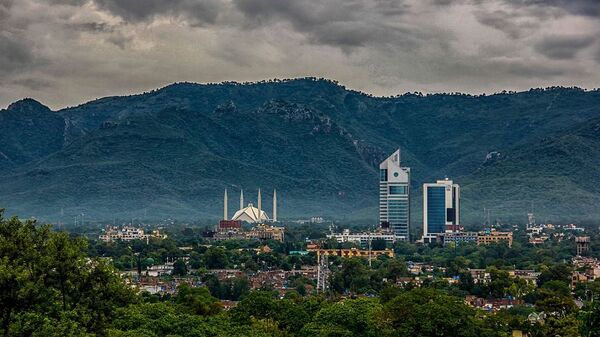Pakistani society is so patriarchal that they cannot even stand seeing a woman’s face in public, says Tooba Syed, a women’s rights activist from Islamabad.
Tooba, who is actively involved in organising the Aurat Azadi March (Women’s Freedom March) on the International Women’s Day on 8 March, was referring to a mural which was defaced by some goons on Tuesday as it showed the faces of two women.
Our existence, our politics, our art, our labour will not be rendered invisible by a handful of right wing goons. We will fight back with our slogans, our creativity and our resolve to continue fighting the system! Before & after of mural. #AuratAzadiMarch2020 pic.twitter.com/Zf2SUr1ysT
— Tooba Syed AWP ☭ (@Tooba_Sd) March 3, 2020
Pakistan is witnessing a new wave of revolution for women’s rights with the upcoming Aurat Azadi March. It is the third year that women, who are otherwise often not allowed to leave their houses without permission, will be taking to the streets in the thousands in cities such as Islamabad, Karachi, Lahore, Quetta, Multan, and Sukkur.
“The first time when events were organised for women’s day celebration was in 2015. Then in 2018 we organised a march in Islamabad. And very organically it was picked up in other cities like Lahore and Karachi. This year we are expecting much bigger crowds as compared to [the] last two times. 2018 was not as big as 2019 and this year is going to be bigger than the last two times”, Tooba told Sputnik.
Importance of the March
The Women’s March in Pakistani cities is not just a day’s event or an isolated act to smash the patriarchal setup, but it is a movement of women to claim public spaces, to claim the right over their own bodies.
“From stepping outside of the house to moral policing of our clothes, everything is controlled. Women are not safe in public spaces. They are not allowed to go outside. Women studying in colleges are not allowed to wear jeans. In a lot of places, they have even put a board stating what clothes women can wear”, Tooba says.
Alleging that much of the societal construct for women is backed by the state, Tooba mentions some court cases.
The activist explains that there are cases where the court has given out guidelines on raising daughters in a way that they don’t marry somebody on their own. In another case, the court directed what makes for a good woman or a bad woman; they construct a woman’s character as per their biases, Tooba says.
But the problems for women in Pakistan don’t end here; serious issues such as rapes, forced conversions, sexual harassment, and honour killings continue to haunt them.
The Madadgaar National Helpline – an offshoot of Lawyers for Human Rights and Legal Aid (LHRLA) in Karachi – has stated that Pakistan is among the countries where 70% women and girls experience physical or sexual violence in their lifetime by their partners and 93% of women experience some form of sexual violence in public spaces in their lifetime.
Constant Backlash from Society
The slogan "Mera Jism Meri Marzi" ("My body, My Rules") has become a chant for the march, but it happens to anger the men in Pakistan most. While the whole idea and movement of women coming out on the streets is facing massive backlash, with abuses being hurled at the organisers, this particular slogan of women claiming the right over their own bodies is being called an act of prostitution.
"The spread of indecency and prostitution in the name of "woman march" is a tragic act"
— Farooq Sattar Rizvi Official (@MFS_Rizvi) March 4, 2020
The daughter of a Muslim cannot say "My body, my will"
Allama Khadim Hussain Rizvi#TLP#khalilurrehmanqamar#AuratAzadiMarch2020#AuratMarch#MeToo#ChitrolOnDemand pic.twitter.com/8jqNLLkAHA
Don't understand the problem so many are having with #MeraJismMeriMarzi"-Mera jism meri marzi nahi toh kis ki marzi ho gi?? "My body is mine" is a critical component of the Life Skills Based Education classes we teach to help children protect themselves from abuse & harassment
— Shehzad Roy (@ShehzadRoy) March 4, 2020
For so called feminists .Which is spreading indecency #MeraJismMeriMarzi #khalilurrehmanqamar pic.twitter.com/xijEhv0ZFW
— Asfand yar BALOCH (@AsfandyarBALOC8) March 4, 2020
the phrase #merajismmerimarzi means complete autonomy on ones body and physical traits. Not being pushed or forced into Sexual harassment, Rape, Forced marriage, Sexual trafficking,Prostitution,Pregnancy or Abortion
— Syeda urooj fatima (@by_rooj) March 4, 2020
On Tuesday, a Lahore court dismissed a petition demanding a ban on the Aurat March. During a debate over the same on a news channel, popular Pakistani director Khalil Ur Rehman Qamar made derogatory comments at a woman journalist with regard to the slogan.
He said: “Tere jism men hai kya (What is so great about your body)? Thookta nahi hai koi tere jism pe (No one would even spit on your body)”.
A Movement for All
The movement, which began in Islamabad among educated women, has also grown roots at the ground level. Tooba says they have been working on the grassroots level - not as a non-governmental organisation, but as the political outfit the Women’s Democratic Front.
“We are working with people in slums, the working class women in all spheres. There is no difference between us. We are fighting and mobilising for the same cause. More representation of women in all spheres and their right over their bodies”, she says.





